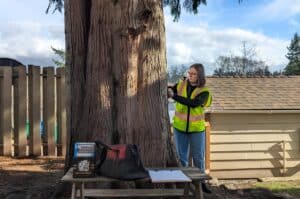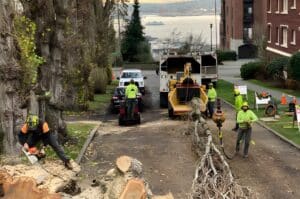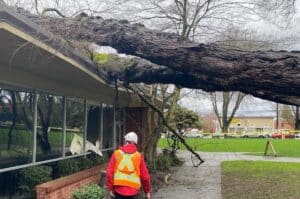Best Privacy Trees for Seattle: 5 Top Choices for Year-Round Screening
Discover the top 5 privacy trees that thrive in Seattle's climate. From native Western Red Cedar to fast-growing Leyland Cypress, find your perfect natural screen.
Creating privacy in your Seattle yard doesn’t require building tall fences or blocking out your neighbors entirely. The right privacy trees can transform your outdoor space into a secluded sanctuary while adding natural beauty and value to your property. With Seattle’s unique climate of wet winters and relatively dry summers, selecting trees that thrive in our Pacific Northwest conditions is essential for long-term success.
Whether you’re looking to screen out busy streets in Capitol Hill, create intimate spaces in your Bellevue backyard, or establish windbreaks in exposed areas of Kirkland, the key is choosing trees that match both your privacy goals and growing conditions. From fast-growing options that provide quick coverage to native species that support local ecosystems, Seattle homeowners have a range of excellent choices for natural screening.
Key Takeaways: Seattle’s Best Privacy Trees
The top 5 privacy trees for Seattle are Western Red Cedar (native, 40-60 feet), Emerald Green Arborvitae (most popular, 12-15 feet), Leyland Cypress (fastest growing, 2-3 feet per year), Douglas Fir (largest properties, 80-100 feet), and Incense Cedar (drought-tolerant alternative, 30-50 feet).
- Western Red Cedar offers the best native option, reaching 40-60 feet with dense, year-round foliage that supports local wildlife while providing excellent wind protection
- Emerald Green Arborvitae is a popular choice for smaller yards, growing 12-15 feet tall and only 3-4 feet wide with minimal maintenance requirements
- Leyland Cypress provides fast privacy solutions, growing 2-3 feet annually to create quick screening for larger properties
- Douglas Fir works best for spacious lots, eventually reaching 80-100 feet while offering excellent storm protection and natural Northwest beauty
- Incense Cedar serves as an excellent alternative to arborvitae, providing narrow growth with distinctive aromatic foliage and better drought tolerance
| Tree Species | Mature Height | Mature Width | Growth Rate | Best For |
|---|---|---|---|---|
| Western Red Cedar | 40-60 feet | 15-20 feet | 1-2 feet/year | Native landscapes, wildlife support |
| Emerald Green Arborvitae | 12-15 feet | 3-4 feet | 6-9 inches/year | Small yards, low maintenance |
| Leyland Cypress | 40-60 feet | 15-20 feet | 2-3 feet/year | Quick coverage, large properties |
| Douglas Fir | 80-100 feet | 20-30 feet | 1-2 feet/year | Large lots, wind protection |
| Incense Cedar | 30-50 feet | 10-15 feet | 1-2 feet/year | Drought tolerance, aromatic foliage |
Top 5 Privacy Trees That Thrive in Seattle
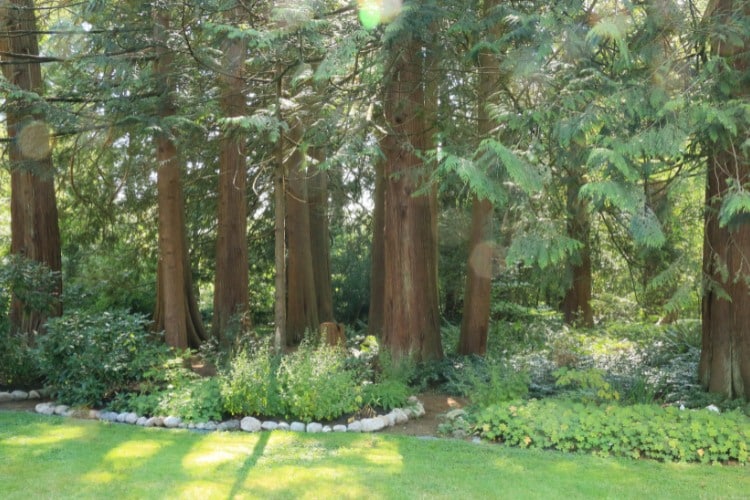
Western Red Cedar offers excellent year-round privacy while supporting local wildlife
What is the best privacy tree for Seattle yards?
Western Red Cedar is the best overall privacy tree for Seattle, being native to the Pacific Northwest with excellent year-round screening, wildlife support, and minimal maintenance once established.
As one of Washington’s most iconic native trees, Western Red Cedar (Thuja plicata) stands out as the ultimate privacy solution for Seattle homeowners who want to embrace local ecology. City of Seattle’s tree selection guidelines note that native species like Western Red Cedar typically require less supplemental watering than non-native alternatives once established.
Western Red Cedar creates an impressive natural screen, typically reaching 40-60 feet in residential settings while maintaining a relatively narrow profile of 15-20 feet wide. The dense, scale-like foliage provides excellent year-round privacy while the distinctive reddish-brown bark adds visual interest to your landscape. What makes this tree particularly valuable is its ability to serve multiple functions: privacy screening, wind protection, and wildlife habitat all in one.
This native choice supports local birds and beneficial insects while requiring minimal supplemental watering once established. The tree’s natural resistance to local pests and diseases means fewer long-term maintenance headaches for homeowners. Plant health care for native species like Western Red Cedar typically focuses on preventive measures rather than reactive treatments.
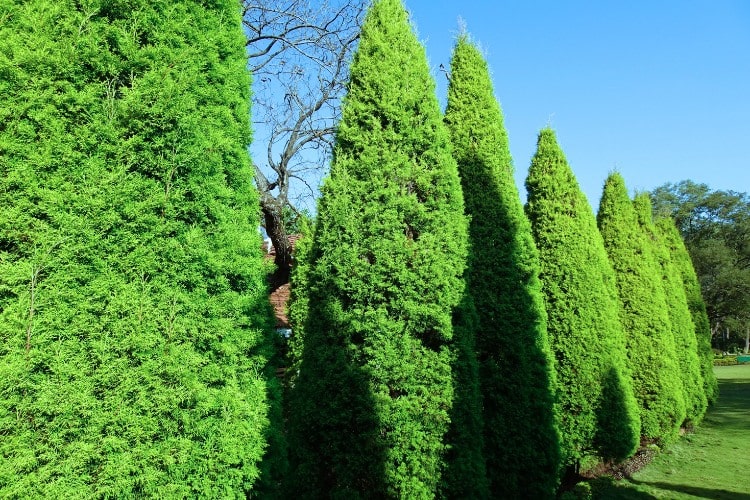
Emerald Green Arborvitae creates an elegant, low-maintenance privacy screen
What is the most popular privacy tree in Seattle?
Emerald Green Arborvitae is a popular privacy tree choice in Seattle, growing 12-15 feet tall and only 3-4 feet wide, making it perfect for typical city lot sizes with minimal maintenance requirements.
Emerald Green Arborvitae (Thuja occidentalis ‘Emerald Green’) has earned a strong reputation as a go-to privacy tree for many Seattle homeowners. This compact evergreen offers an excellent balance of effective screening and manageable size for urban lots.
Growing to a mature height of 12-15 feet with a narrow width of just 3-4 feet, Emerald Green Arborvitae fits beautifully in smaller yards without overwhelming the space. The dense, bright green foliage maintains its color throughout Seattle’s gray winters, providing consistent screening year-round. Unlike larger privacy trees, arborvitae requires virtually no pruning to maintain its natural pyramidal shape.
This tree adapts well to various soil types common in the Seattle area and tolerates both full sun and partial shade conditions. When planted 3-4 feet apart, individual trees quickly grow together to form a solid living wall. The relatively modest root system makes Emerald Green Arborvitae safe to plant near driveways, patios, and property lines without concerns about future foundation damage.
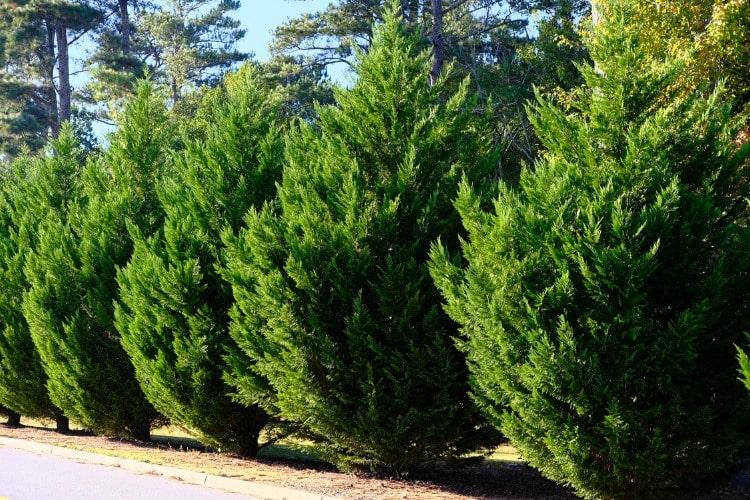
Fast-growing Leyland Cypress trees let you establish effective screening within just a few seasons
What is the fastest-growing privacy tree for Seattle?
Leyland Cypress is among the fastest-growing privacy trees for Seattle, capable of growing 2-3 feet per year in optimal conditions, providing effective screening within 3-5 years of planting.
For homeowners who need privacy quickly, Leyland Cypress (x Cupressocyparis leylandii) delivers impressive results. This hybrid evergreen consistently exhibits strong annual growth rates, making it possible to establish effective screening within just a few seasons.
Leyland Cypress typically reaches 40-60 feet in height at maturity, with a spread of 15-20 feet, making it best suited for larger properties where space isn’t a constraint. The feathery, blue-green to gray-green foliage creates dense screening from ground level up, effectively blocking views while allowing light to filter through.
This fast-growing tree adapts to various soil conditions and tolerates Seattle’s wet winters better than many cypress varieties. However, regular pruning and maintenance become necessary to control size and maintain the desired shape, especially in smaller yard settings. The rapid growth that makes Leyland Cypress attractive for quick privacy also means ongoing management to prevent the tree from outgrowing its intended space.
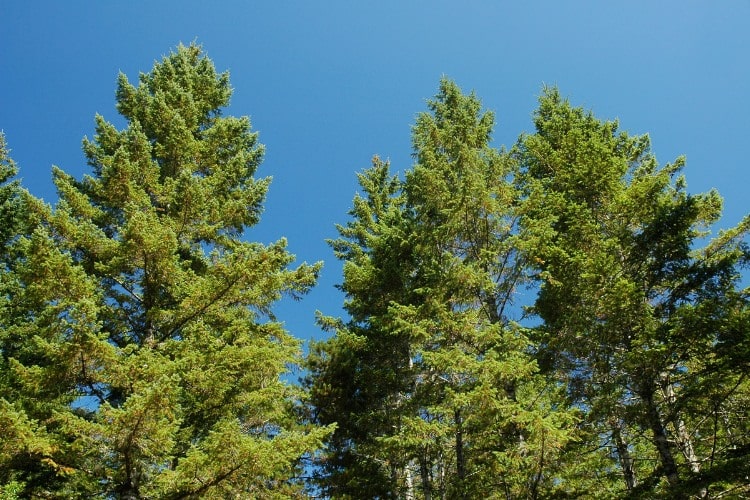
For properties with sufficient space, Douglas Fir creates a dramatic backdrop that enhances property value while providing generations of natural screening.
What type of privacy tree is best for large Seattle properties?
Douglas Fir is an excellent privacy tree for large Seattle properties, reaching 80-100 feet at maturity with excellent wind protection and natural Northwest beauty, but requires at least 30 feet of clearance from structures.
Douglas Fir (Pseudotsuga menziesii) represents the quintessential Pacific Northwest tree, offering unmatched privacy screening for homeowners with larger properties. This native species offers exceptional wind resistance, making it an ideal choice for properties in exposed locations.
In residential settings, Douglas Fir typically reaches 80-100 feet with a mature spread of 20-30 feet. The tree’s straight trunk and high canopy make it a good choice for creating privacy without blocking too much light from reaching the ground below. The distinctive flat needles and unique cones add natural beauty while the strong wood structure provides excellent wind protection.
As a native species, Douglas Fir requires minimal irrigation once established and naturally resists local pests and diseases. The tree’s deep root system makes it extremely stable during Pacific Northwest windstorms. For properties with sufficient space, Douglas Fir creates a dramatic backdrop that enhances property value while providing generations of natural screening.
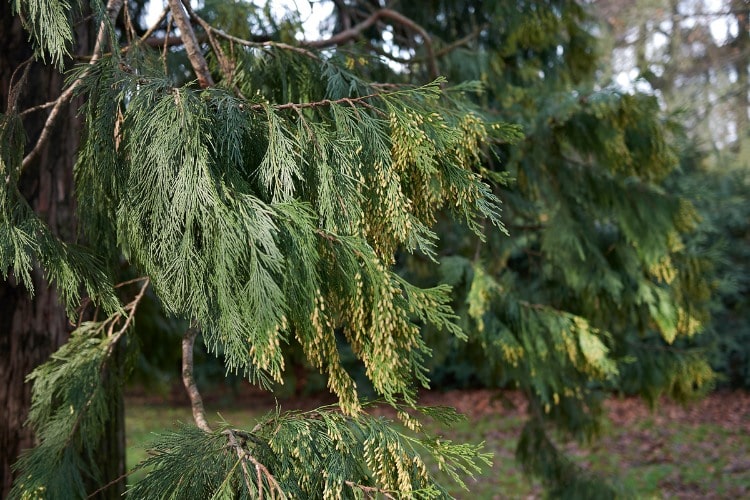
incense Cedar maintains healthy growth with less supplemental irrigation than most other evergreen privacy trees.
What is the best drought-tolerant privacy tree for Seattle?
Incense Cedar is an excellent drought-tolerant privacy tree for Seattle, requiring less summer watering than arborvitae while providing excellent narrow screening and aromatic foliage.
Incense Cedar (Calocedrus decurrens) offers Seattle homeowners an excellent alternative to traditional arborvitae, combining effective privacy screening with distinctive aromatic qualities and superior drought tolerance. This evergreen maintains healthy growth with less supplemental irrigation than most other evergreen privacy trees.
This evergreen typically grows 30-50 feet tall with a narrow, columnar shape that rarely exceeds 10-15 feet in width. The scale-like foliage releases a pleasant, spicy fragrance when brushed against, making it a sensory addition to your landscape. The reddish-brown bark develops attractive furrows as the tree matures, adding visual interest beyond just the screening function.
Incense Cedar adapts particularly well to Seattle’s drier summer months, requiring less supplemental watering than many other privacy trees once established. The tree’s natural resistance to common evergreen pests makes it a low-maintenance choice for busy homeowners. When planted as a screen, Incense Cedar provides excellent privacy while maintaining an elegant, formal appearance.
Essential Privacy Tree Planting Requirements for Seattle
Successful privacy tree planting in Seattle requires considering:
- the tree’s mature size (allowing 15-30 feet of clearance from structures),
- soil drainage (most species prefer well-draining soil),
- sun exposure (6+ hours of daily sunlight for most species), and
- compliance with Seattle’s tree protection ordinance.
How much space do privacy trees need at maturity?
Privacy trees need space equal to half their mature width from structures. Emerald Green Arborvitae needs 2 feet clearance, while Douglas Fir requires 15+ feet from buildings and cannot be planted under power lines.
| Tree Species | Minimum Distance from House | Minimum Distance from Power Lines | Spacing Between Trees |
|---|---|---|---|
| Emerald Green Arborvitae | 2-3 feet | Safe (under 25 feet) | 3-4 feet |
| Western Red Cedar | 8-10 feet | Not suitable | 8-12 feet |
| Leyland Cypress | 8-10 feet | Not suitable | 6-8 feet |
| Douglas Fir | 15+ feet | Not suitable | 20-30 feet |
| Incense Cedar | 5-8 feet | Safe (under 25 feet) | 8-10 feet |
One of the biggest mistakes Seattle homeowners make is underestimating the mature size of privacy trees. That small nursery tree will eventually reach its full dimensions, potentially causing expensive problems if planted too close to structures or utility lines.
Always research the mature height and width of your chosen species, then plan accordingly. Trees should be planted at least half their mature width away from buildings, driveways, and property lines. For trees under power lines, Seattle City Light requires species that won’t exceed 25 feet at maturity. Larger trees, such as Douglas Fir, should be placed at least 30 feet from structures and shouldn’t be planted under any overhead utilities.
Consider both horizontal and vertical space when planning your privacy screen. Even narrow trees, like Emerald Green Arborvitae, need adequate spacing for optimal air circulation and healthy growth. Crowded plantings lead to poor tree health and reduced privacy effectiveness over time.
What level of sun and wind exposure do Seattle privacy trees need?
Most privacy trees need 6+ hours of direct sunlight daily. Western Red Cedar and Douglas Fir tolerate partial shade better than Emerald Green Arborvitae or Leyland Cypress, which require full sun for optimal growth.
| Tree Species | Sun Requirements | Shade Tolerance | Wind Resistance |
|---|---|---|---|
| Western Red Cedar | Full sun to partial shade | High | Excellent |
| Emerald Green Arborvitae | Full sun preferred | Moderate | Good |
| Leyland Cypress | Full sun required | Low | Good |
| Douglas Fir | Full sun to partial shade | High | Excellent |
| Incense Cedar | Full sun preferred | Low | Good |
Seattle’s varied topography creates different microclimates throughout the region, making sun and wind exposure critical factors in tree selection. Most privacy trees perform best in full sun to partial shade, but specific requirements vary by species.
Western Red Cedar and Douglas Fir tolerate partial shade better than Emerald Green Arborvitae or Leyland Cypress, making them suitable for areas with existing mature trees or north-facing exposures. Incense Cedar requires full sun for optimal growth and may struggle in heavily shaded locations.
Wind exposure affects both tree selection and placement. Areas exposed to prevailing winds from Puget Sound benefit from wind-resistant species like Douglas Fir or Western Red Cedar. These trees can actually serve double duty, providing privacy while protecting more delicate plants from harsh winds. Sheltered locations allow for the successful growth of less wind-tolerant species like Emerald Green Arborvitae.
How much water do privacy trees need in Seattle?
New privacy trees need 1-2 inches of water weekly during their first 2-3 years. Native species like Western Red Cedar become drought-tolerant once established, while non-natives may need supplemental summer watering throughout their lives.
| Tree Species | Establishment Period | Summer Water Needs (Mature) | Winter Tolerance |
|---|---|---|---|
| Western Red Cedar | 2-3 years | Low (drought tolerant) | Excellent |
| Emerald Green Arborvitae | 2-3 years | Moderate (supplemental needed) | Good |
| Leyland Cypress | 2-3 years | Moderate | Good (needs drainage) |
| Douglas Fir | 2-3 years | Low (drought tolerant) | Excellent |
| Incense Cedar | 2-3 years | Low (drought tolerant) | Good |
Seattle’s distinct wet and dry seasons require careful consideration of each tree’s water requirements. All newly planted privacy trees need consistent moisture during their first 2-3 years of establishment, regardless of species.
During establishment, provide deep, weekly watering throughout the growing season, especially during Seattle’s typically dry summers from July through September. Native species like Western Red Cedar and Douglas Fir become quite drought-tolerant once established, while non-native species like Emerald Green Arborvitae may need supplemental summer watering throughout their lives.
Seattle’s wet winters can actually pose challenges for some privacy trees. Leyland Cypress and Incense Cedar prefer well-draining soil and may struggle in areas with standing water during periods of heavy rain. Proper site preparation and drainage consideration prevent root rot and other moisture-related problems.
What soil conditions do Seattle privacy trees need?
Most privacy trees prefer well-draining soil with pH 6.0-7.0. Native species like Western Red Cedar adapt to Seattle’s varied soil types, while Emerald Green Arborvitae may need soil amendments in heavy clay areas.
| Tree Species | Soil Type Preference | Drainage Requirements | pH Range | Clay Soil Tolerance |
|---|---|---|---|---|
| Western Red Cedar | Adaptable to most | Moderate to good | 5.5-7.5 | High |
| Emerald Green Arborvitae | Loamy, well-draining | Good drainage required | 6.0-7.0 | Moderate (needs amendments) |
| Leyland Cypress | Well-draining | Excellent drainage required | 6.0-8.0 | Low (may need raised planting) |
| Douglas Fir | Adaptable to most | Moderate to good | 5.0-7.0 | High |
| Incense Cedar | Well-draining | Good drainage preferred | 6.0-7.5 | Moderate |
Seattle’s diverse soil types, from sandy areas near Puget Sound to clay-heavy locations in neighborhoods like West Seattle, require different approaches to privacy tree planting.
Native species like Western Red Cedar and Douglas Fir adapt to a wide range of soil conditions in and around Seattle, from sandy loam to heavier clay soils. Emerald Green Arborvitae prefers consistently moist but well-draining soil and benefits from soil amendments in areas with heavy clay. Leyland Cypress requires excellent drainage and may need raised planting or soil modification in poorly draining locations.
Professional soil testing helps determine pH levels and nutrient content, guiding the development of effective soil improvement strategies. Proper soil drainage is essential to successfully get trees established, as poor drainage conditions can lead to root problems and tree failure.
How should privacy trees be spaced for effective screening?
Space Emerald Green Arborvitae 3-4 feet apart, Western Red Cedar 8-12 feet apart, and Leyland Cypress 6-8 feet apart for solid privacy screens. Closer spacing provides faster coverage but may cause competition issues.
| Screening Goal | Emerald Green Arborvitae | Western Red Cedar | Leyland Cypress | Timeline to Privacy |
|---|---|---|---|---|
| Solid Screen | 3-4 feet apart | 8-12 feet apart | 6-8 feet apart | 5-7 years |
| Partial Screen | 5-6 feet apart | 12-15 feet apart | 8-10 feet apart | 3-5 years |
| Individual Specimens | 8-10 feet apart | 15-20 feet apart | 12-15 feet apart | 2-3 years |
Creating an effective privacy screen requires striking a balance between immediate coverage goals and long-term tree health. Proper spacing is essential because trees planted too closely can compete for resources and develop health issues due to poor air circulation.
Individual specimen trees require different spacing considerations. Single privacy trees should be planted with their mature spread in mind, typically requiring 15-30 feet of clearance from other trees, depending on the species. This spacing allows each tree to develop its natural shape while providing adequate growing space.
When is the best time to plant privacy trees in Seattle?
Fall (September-November) is the optimal planting time for privacy trees in Seattle, allowing winter rains to establish root systems before summer heat. Spring planting (March-May) is the second-best option.
| Planting Season | Advantages | Disadvantages | Success Rate |
|---|---|---|---|
| Fall (Sept-Nov) | Natural rain establishment, mild temperatures | Limited growing season before winter | 85-90% |
| Spring (Mar-May) | Full growing season ahead | Requires consistent watering | 80-85% |
| Summer (Jun-Aug) | Immediate planting availability | High water needs, heat stress | 60-70% |
| Winter (Dec-Feb) | Less expensive, good for hardy species | Soil conditions may be poor | 70-75% |
Seattle’s climate offers an extended planting season, but timing has a significant impact on establishment success and long-term tree health. Fall planting is generally preferred because it allows trees to establish their root systems during the mild, wet winter months before facing summer heat stress.
Winter planting is possible for hardy species like Western Red Cedar and Douglas Fir, but soil conditions and weather patterns should guide timing decisions. Frozen or waterlogged soil conditions can damage roots and delay establishment.
Why Professional Privacy Tree Planning Matters
“We see so many homeowners who plant privacy trees without considering their mature size or Seattle’s specific growing conditions. Taking time for proper planning upfront saves thousands in replacement costs and years of frustration down the road.” – Kelsey Gruenwoldt, Co-Owner, Seattle Tree Care
While selecting privacy trees may seem straightforward, professional guidance helps avoid expensive mistakes and ensures long-term success. Seattle’s varied microclimates, soil conditions, and local regulations create complexities that experienced arborists regularly navigate.
Our team of ISA Certified Arborists provides comprehensive site assessments that consider your specific growing conditions, privacy goals, and budget constraints. We evaluate factors like mature tree size, utility line locations, soil drainage, and sun exposure to recommend the best species for your unique situation.
Professional tree selection also considers long-term maintenance requirements and potential problems. Some fast-growing privacy trees require regular pruning to maintain their screening effectiveness, while others may be susceptible to specific pests or diseases common in the Seattle area. Professional consultation helps reduce long-term maintenance costs through proper initial planning.
Our team stays current with Seattle’s evolving tree protection ordinance and can handle permit applications when required. This expertise saves you time and helps avoid compliance issues that could delay or complicate privacy tree projects.
Frequently Asked Questions About Seattle Privacy Trees
How quickly can I expect privacy from newly planted trees?
Fast-growing Leyland Cypress provides meaningful screening in 2-3 years, while Emerald Green Arborvitae takes 4-6 years for solid coverage. Starting with larger nursery stock accelerates the timeline but increases costs.
The timeline varies significantly by species and planting size. Most privacy trees reach effective screening height within 5-7 years when properly planted and maintained. Leyland Cypress, growing 2-3 feet annually, can provide meaningful screening within 2-3 years, whereas slower-growing trees like Emerald Green Arborvitae typically take 4-6 years to achieve solid coverage.
What’s the best spacing between privacy trees for a solid screen?
Space Emerald Green Arborvitae 3-4 feet apart, Western Red Cedar 8-12 feet apart, and Leyland Cypress 6-8 feet apart for solid privacy screens that form within 5-7 years.
Spacing depends on the species and desired timeline for coverage. Closer spacing provides faster coverage but may lead to competition and health issues as trees mature. Our arborists can recommend optimal spacing based on your specific privacy goals and timeline.
Do I need permits to plant privacy trees in Seattle?
No permits are required for planting new trees in Seattle. However, removing existing trees over 6 inches in diameter requires permits under Seattle’s tree protection ordinance, with replacement requirements often mandating multiple new trees.
Seattle’s tree protection ordinance has a significant impact on privacy tree planning, particularly regarding tree removal and replacement requirements. Seattle’s Department of Construction and Inspections requires permits for removing trees with a diameter of 6 inches or more, and replacement requirements often mandate planting 2-3 trees for each one removed.
Environmentally sensitive areas have additional restrictions, and some neighborhoods have specific tree preservation requirements. Properties in critical areas may be subject to additional permitting requirements for any landscaping changes. Our certified arborists can help navigate permit requirements and ensure your privacy tree project complies with all local regulations.
How much maintenance do privacy trees require?
Native trees like Western Red Cedar require minimal maintenance once established. Emerald Green Arborvitae needs little pruning but benefits from summer watering. Fast-growing species like Leyland Cypress may require annual pruning.
Maintenance needs vary by species. Native trees, such as Western Red Cedar and Douglas Fir, require minimal care once established, primarily consisting of occasional pruning for shape and health maintenance. Emerald Green Arborvitae needs little pruning but benefits from regular watering during dry periods. Fast-growing species like Leyland Cypress may require annual pruning to maintain the desired size and shape. All privacy trees benefit from regular monitoring for pest and disease issues.
Can privacy trees survive Seattle’s windstorms?
Yes, most recommended privacy trees handle Seattle’s windstorms well when properly established. Native species like Douglas Fir and Western Red Cedar show excellent wind resistance when properly planted and maintained.
Most recommended privacy trees handle Seattle’s typical windstorms well when properly established. Native species like Douglas Fir and Western Red Cedar have evolved to withstand Pacific Northwest weather patterns. Properly planted and maintained privacy trees generally perform well during major wind events. Proper planting techniques, adequate spacing, and regular maintenance help ensure wind resistance.
What’s the cost difference between DIY planting and professional installation?
Professional installation costs 2-3 times more than DIY but includes proper site preparation, species selection, and warranty coverage. DIY mistakes often cost more long-term through tree loss and replacement needs.
Professional installation typically costs 2-3 times more than DIY planting but includes proper site preparation, appropriate tree selection, and establishment care. DIY mistakes often result in higher costs in the long run, including tree loss, replacement needs, or structural damage. Professional installation also includes warranty coverage and ongoing support. For privacy tree projects involving multiple trees or challenging site conditions, professional installation usually provides better long-term value.
Transform Your Seattle Property with Expert Privacy Tree Selection
Creating an effective privacy screen requires more than just planting trees and hoping for the best. Success depends on choosing the right species for your specific conditions, proper planning for mature size, and professional installation techniques that ensure long-term health and effectiveness.
Whether you’re looking to screen busy streets in your Seattle neighborhood, create intimate spaces in your Bellevue backyard, or establish windbreaks for your Kirkland property, we can help you select and establish the perfect privacy trees for your unique situation.
At Seattle Tree Care, our team of ISA Certified Arborists brings years of experience helping homeowners throughout the greater Seattle region create beautiful, functional privacy screens. From initial consultation and species selection through ongoing care, we provide comprehensive support for your landscape investment.
Ready to transform your outdoor space with professional privacy trees?
Call Seattle Tree Care at 206-789-0534 or request your free consultation today. Let our certified arborists help you create the private sanctuary you’ve been dreaming of.
SEE MORE ARTICLES FROM OUR b(LOG)
We've got you covered with tips, resources, updates, how-to's, and other helpful information about trees and landscapes in Seattle, Puget Sound, and King County, WA. Join the thousands of smart local residents who get the monthly newsletter from Seattle Tree Care for helpful information you won't want to miss!
There's no spam - we promise! We are committed to keeping your e-mail address confidential. We do not sell, rent, or lease our contact data or lists to third parties.


